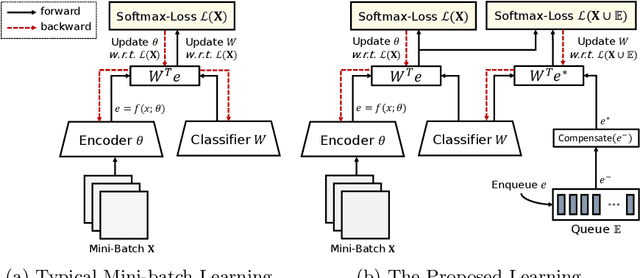BroadFace: Looking at Tens of Thousands of People at Once for Face Recognition
Paper and Code
Aug 15, 2020



The datasets of face recognition contain an enormous number of identities and instances. However, conventional methods have difficulty in reflecting the entire distribution of the datasets because a mini-batch of small size contains only a small portion of all identities. To overcome this difficulty, we propose a novel method called BroadFace, which is a learning process to consider a massive set of identities, comprehensively. In BroadFace, a linear classifier learns optimal decision boundaries among identities from a large number of embedding vectors accumulated over past iterations. By referring more instances at once, the optimality of the classifier is naturally increased on the entire datasets. Thus, the encoder is also globally optimized by referring the weight matrix of the classifier. Moreover, we propose a novel compensation method to increase the number of referenced instances in the training stage. BroadFace can be easily applied on many existing methods to accelerate a learning process and obtain a significant improvement in accuracy without extra computational burden at inference stage. We perform extensive ablation studies and experiments on various datasets to show the effectiveness of BroadFace, and also empirically prove the validity of our compensation method. BroadFace achieves the state-of-the-art results with significant improvements on nine datasets in 1:1 face verification and 1:N face identification tasks, and is also effective in image retrieval.
 Add to Chrome
Add to Chrome Add to Firefox
Add to Firefox Add to Edge
Add to Edge